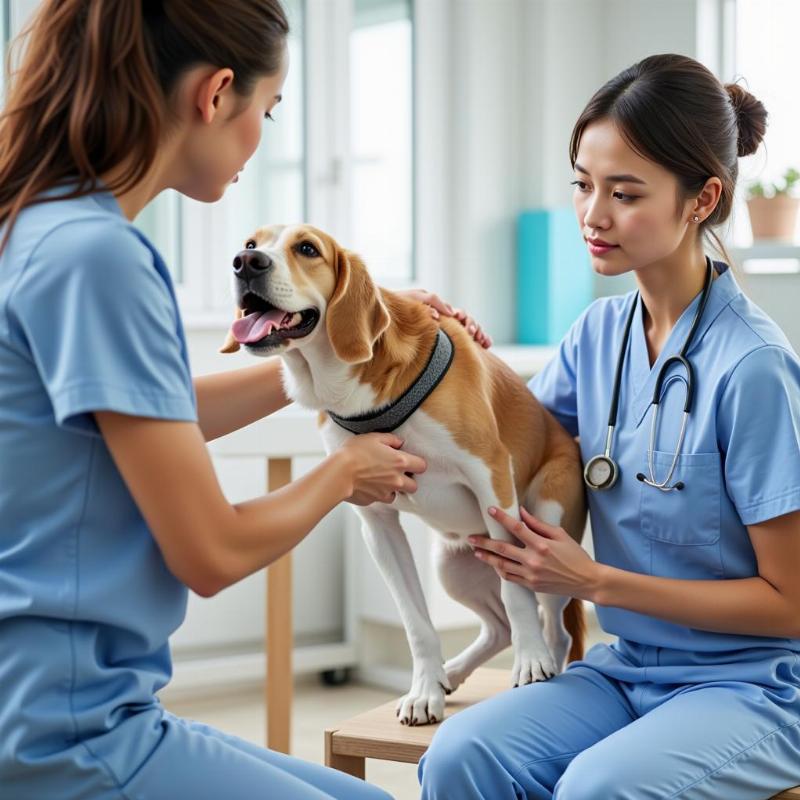Breeding a mother dog with her son is highly discouraged and considered unethical within the responsible dog breeding community in the United States. While biologically possible, this practice, known as inbreeding or linebreeding, significantly increases the risk of serious health and temperament problems in the offspring. Understanding the risks involved is crucial for any responsible dog owner considering breeding.
The Dangers of Inbreeding: Why You Shouldn’t Breed Mother and Son Dogs
Breeding closely related dogs, like a mother and son, narrows the gene pool. This increases the chances of harmful recessive genes, which are normally masked by dominant genes, becoming expressed in the puppies. These recessive genes can lead to a variety of genetic disorders, including hip dysplasia, heart defects, autoimmune diseases, and respiratory problems.
In addition to physical health issues, inbreeding can also negatively impact a dog’s temperament. Puppies from inbred litters may exhibit increased aggression, anxiety, or fearfulness, making them unsuitable for family homes. They may also be more susceptible to learning difficulties and behavioral problems. Responsible breeders prioritize the health and well-being of their dogs above all else, and avoid practices like mother-son breeding that jeopardize these qualities.
What are the Alternatives to Mother-Son Breeding?
If you’re aiming to preserve specific desirable traits in your dog’s lineage, there are safer and more ethical alternatives to mother-son breeding. Outcrossing, which involves breeding unrelated dogs of the same breed, is the recommended practice. This introduces new genetic material, strengthening the bloodline and reducing the risk of inherited diseases.
Another option is linebreeding, which involves breeding more distantly related dogs, such as cousins or grandparents. While linebreeding can still carry some risks, it’s less risky than close inbreeding like mother-son breeding. However, careful genetic screening and selection are crucial to minimize potential problems.
Understanding Responsible Dog Breeding Practices in the US
Responsible dog breeding in the United States adheres to strict ethical guidelines and prioritizes the health and welfare of the animals. The American Kennel Club (AKC) provides valuable resources and guidelines for responsible breeding, emphasizing the importance of genetic health testing, proper socialization, and avoiding harmful breeding practices like inbreeding.
 Responsible dog breeding practices
Responsible dog breeding practices
Seeking Professional Advice: Veterinarians and Breeders
Before considering breeding any dog, it’s essential to consult with a qualified veterinarian. They can provide valuable insights into the potential health risks associated with specific breeds and recommend appropriate genetic testing. Experienced dog breeders are also invaluable resources, offering guidance on ethical breeding practices and helping you make informed decisions that prioritize the well-being of your dogs.
Conclusion: Prioritizing Dog Health and Welfare
Breeding a mother dog with her son is a practice fraught with potential health and behavioral risks for the offspring. Responsible dog owners and breeders in the United States prioritize the health and well-being of their dogs and avoid such practices. By understanding the dangers of inbreeding and exploring ethical alternatives, we can contribute to a healthier and happier canine population.
FAQ:
- What is the closest relation you can breed dogs? It’s generally recommended to avoid breeding dogs closer than cousins.
- What are the signs of inbreeding in dogs? Signs can include physical deformities, smaller litter sizes, increased susceptibility to diseases, and behavioral problems.
- Why is inbreeding bad for dogs? Inbreeding increases the likelihood of genetic disorders and weakens the immune system.
- Is linebreeding the same as inbreeding? Linebreeding involves more distantly related dogs than inbreeding, but still carries some risks.
- Where can I find a reputable dog breeder? The AKC website is a good starting point for finding reputable breeders.
- What should I ask a breeder before buying a puppy? Ask about health testing, socialization practices, and the parents’ lineage.
- What are the responsibilities of a dog breeder? Breeders should prioritize the health and well-being of their dogs, adhere to ethical breeding practices, and provide proper care and socialization.
Beautdogs.us is your premier online destination for comprehensive and reliable information on dog care, breeds, and lifestyle in the United States. Whether you’re a seasoned dog owner or just starting your journey, Beautdogs.us offers expert advice, product reviews, and valuable resources to help you provide the best possible care for your canine companion. We are committed to promoting responsible dog ownership and connecting you with the information and resources you need. Contact us today for all your dog-related needs! Email: [email protected], Phone: +1 501-555-7529. Connect with Beautdogs.us now!